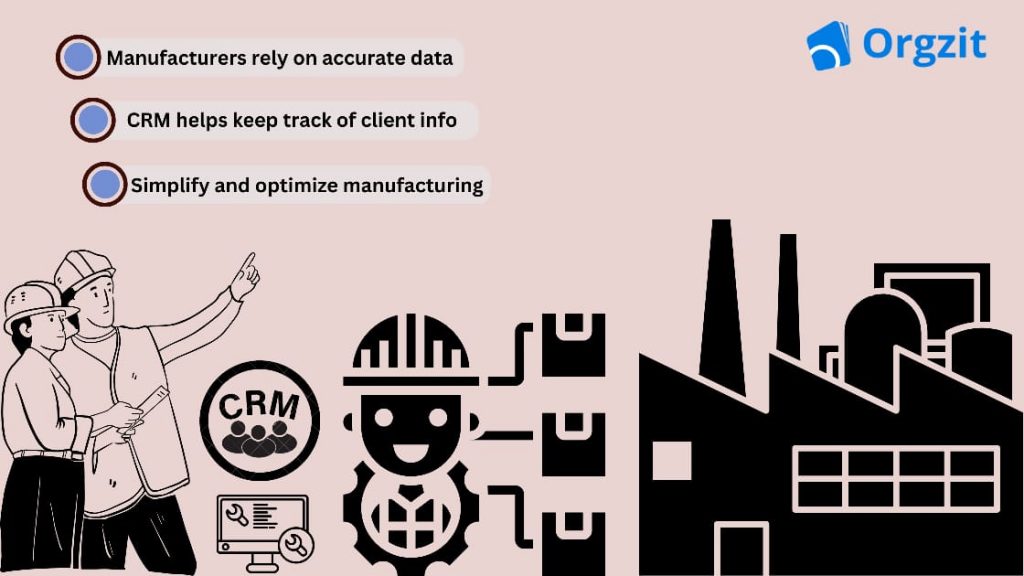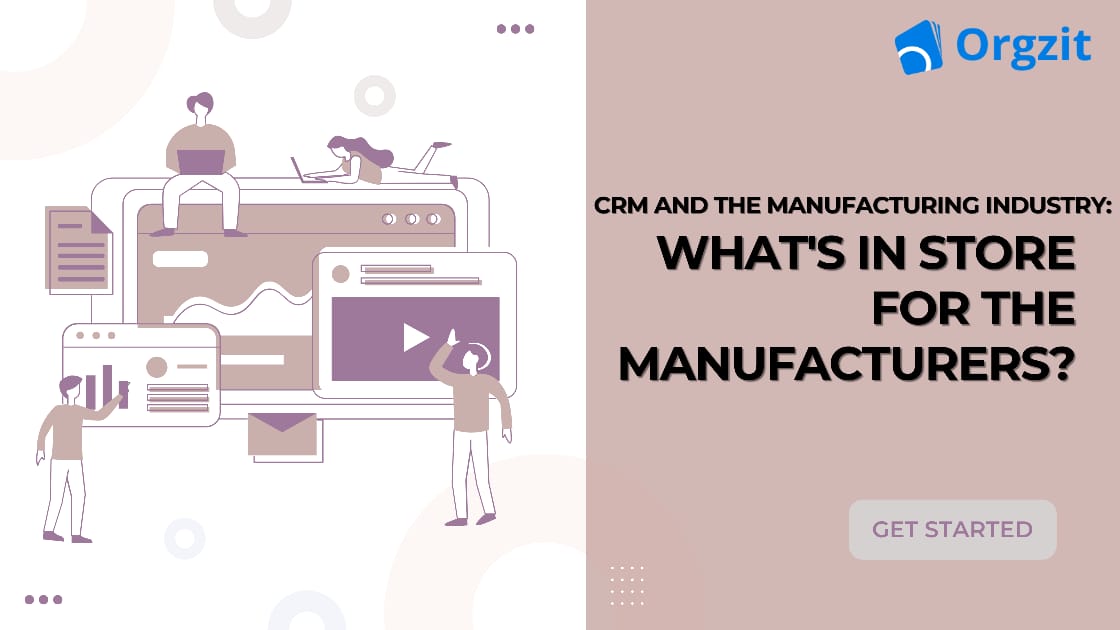Proven strategies to boost Customer Loyalty in the Manufacturing Sector!
CRM is a software solution designed to assist businesses and companies in organizing all their data and contacts with both old, new, and potential customers. When it comes to manufacturers, accurate and organized customer data (from multiple channels) is essential for forecasting both sales and production, tracking assets, nurturing leads, and integrating ERP. Manufacturing CRM software are powerful tools that help manufacturers manage and smoothen the sales process and allow them to
= Keep a record of their clients’ past orders,
= Find new business prospects and sales leads
= Make the sales process more efficient and do away with time-consuming procedures like follow-ups and emails.
= Streamline the process for current customers to receive better service.
TL;DR
- In a nutshell, CRM is a software solution designed to help businesses organize their data and contacts with customers, including old, new, and potential customers.
- It plays a crucial role in the manufacturing industry by acting as a central point for company data, forecasting sales and production, tracking assets, nurturing leads, and integrating ERP.
- A CRM can be a strategic tool for manufacturers, helping them understand customer requirements, optimize interactions, and close deals faster.
- Orgzit, a cloud-based CRM system, is an example of a CRM system that can significantly optimize operations and result in revenue growth.
What role does a CRM play in manufacturing?
Manufacturers rely on accurate data, and while no one can predict the future perfectly, a manufacturing CRM is able to assist by acting as a central point for company data. A CRM, in addition to storing data, includes sales and production predictions, asset tracking, leads nurturing, and ERP connection.
A manufacturing CRM’s purpose is to assist manufacturers in developing deeper, more profitable connections with their customers by offering a comprehensive view of consumer data and enabling targeted personalized communication and engagement.
When your firm implements a manufacturing CRM, it indicates a commitment to optimizing sales and marketing operations, enhancing client loyalty and retention, and eventually driving revenue growth.
What Makes a Good Manufacturing CRM?
Let’s take a look at some of the main characteristics that create outstanding manufacturing CRM software.
A CRM system should offer comprehensive analytics, customizable dashboards, and robust reporting features for better business decision-making.
It should also offer scalability, customization options, and automated lead generation and management processes for efficient customer outreach.
The CRM system offers workflow automation, order management, and customer service processes, with a user-friendly interface, mobile and remote access, and affordable pricing plans for manufacturing businesses of all sizes.
You can also read Essential Metrics for Manufacturer’s Rep
What are the benefits of using CRM in the manufacturing industry?
- EFFICIENCY: CRM automates activities, manages prospects, and provides data-driven insights, which can enhance sales and minimize costs.
- CUSTOMER RELATIONSHIPS: CRM enables manufacturers to understand their consumers’ requirements and preferences better, facilitating more personalized communication and boosting customer satisfaction.
- IMPROVED COMMUNICATION: With a CRM, Manufacturers can interact more efficiently with customers, suppliers, and distributors, resulting in higher levels of supply chain management and collaboration.
- INVENTORY TRACKING AND MANAGEMENT: CRM can help optimize inventory levels by detecting demand trends and guaranteeing prompt replenishment, lowering carrying costs, and minimizing stockouts.
- CENTRALIZED CUSTOMER DATA: CRM systems compile all customer data into a consolidated single repository, facilitating manufacturers’ access to and use of the information for both marketing initiatives as well as decision-making.
- PREDICTIONS AND ANALYTICS: CRM systems provide essential analytics and forecasting tools to assist manufacturers in anticipating market trends, demand changes, and production requirements.
- QUALITY MONITOR AND CONTROL: CRM can help manufacturers discover and address issues quickly by monitoring product quality and collecting customer feedback.
- COMPETITIVE EDGE: By leveraging CRM data, manufacturers can remain competitive by adapting their products and services to evolving customer needs and market conditions.
- POST-PURCHASE SUPPORT: Through CRM, manufacturers can provide greater post-sales support and assistance, resulting in a positive customer experience and long-term loyalty.
- OBSERVATION AND REPORTING: CRM solutions can help factories manage regulatory compliance while also creating information for audits and quality control.
- HIGH-QUALITY LEADS: More customers and greater revenue come from improved sales operations. High-quality leads can be aided, nevertheless, by enhanced sales procedures. You can achieve it thanks to lead management in CRM software for manufacturers.
- BETTER SALES PERFORMANCE: A manufacturing company can use CRM to analyze deal-close rates, lead generation, and other factors based on historical data, obtain insightful knowledge of consumer behavior, prioritize customers based on purchase volume, and more. The forecasting of future sales and growth requires the use of the data provided by CRM.


How can you select the ideal CRM for your manufacturing business?
Create a cross-functional team with representatives from the sales, marketing, and other departments using the solution before you start searching online.
Those who labor in the trenches have a better grasp of what will and won’t work since they often deal with the current system. Including end customers increases adoption and buy-in once a purchase is made.
Ask each team member to discuss the current workflow, emphasizing any bottlenecks and places where a lack of data reduces effectiveness.
Analyze the reports that the team has access to and think about how they might be improved.
Find out how the team rates its own performance, the performance of the team as a whole, and the performance of the marketing and sales assets.
Compile a list of the programs and systems that the CRM needs to interact with.
If you can, figure out the cost of the current processes so you have a benchmark to measure the potential impact of a CRM system.
Conclusion: CRM: A Strategic tool for manufacturers!
Manufacturing CRMs are software systems that allow manufacturers to keep track of client information such as addresses, phone numbers, demographics, and pain issues. Salespeople can use this data to gain a deeper understanding of their customers, spot opportunities, and close deals faster.
Manufacturing CRM system is based on the fundamental tenet that it helps the business fully comprehend the requirements and expectations of their customers. It also enables them to optimize customer interactions and enhance contacts with them.
Simplify and optimize manufacturing with ORGZIT
Manufacturing has many moving parts and produces a lot of data, which requires extensive tracking. Investing in CRM designed for the manufacturing industry can significantly optimize operations and result in revenue growth. Businesses can improve lead qualification, sales processes, and customer service, and gain better insight into operations.
Orgzit is an example of a CRM system that operates in the cloud and consists of various cloud solutions: sales management, quoting, invoicing, stock keeping, dealer/contractor management, and much more.
Orgzit is really simple and intuitive to use. It can be customized in minutes, even by business users. It is built for agile teams with constrained IT resources and is highly cost-effective with transparent, all-inclusive pricing.
Orgzit assists manufacturers in automating their operations to create smarter businesses that enable better decision-making while upholding stringent safety and regulatory compliance. Our cutting-edge technologies, in-depth domain knowledge, and well-defined plans will increase efficiency while enhancing visibility into your organization.
Don’t believe us, hear from our customers.


FAQs
A manufacturing CRM serves as a central point for accurate data, assisting manufacturers in sales, production predictions, asset tracking, leads nurturing, and ERP connection.
A CRM system for manufacturers should provide analytics, dashboards, reporting, scalability, customization, automated lead generation, workflow automation, order management, customer service, user-friendly interface, mobile and remote access, and affordable pricing.
🔹What are the CRM roles and responsibilities in the manufacturing industry?
CRM software offers numerous benefits to the manufacturing industry, including efficiency, improved customer relationships, communication, inventory tracking, centralized customer data, analytics, quality monitoring, competitive edge, post-purchase support, regulatory compliance management, high-quality leads, better sales performance, and better customer experience.
🔹How to select the right Manufacturing CRM?
To choose the right CRM for your manufacturing firm, create a cross-functional team with representatives from sales, marketing, and other departments to understand the system’s effectiveness. Include end customers to increase adoption. Discuss workflow issues, analyze reports, and evaluate team performance. Compile a list of CRM-related programs and systems, and calculate the cost of current processes to measure the potential impact of a CRM system.









